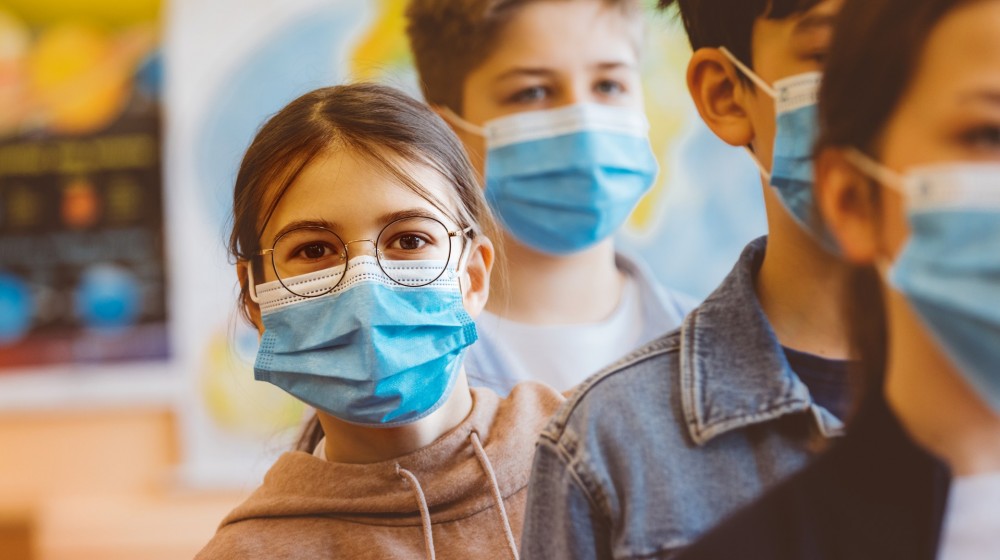A return to school like no other… and one that is more difficult for vulnerable youth
It’s back to class this week for the thousands of children and teens across Greater Montreal who have not set foot on school grounds since mid-March.
We know that the distance-learning experience has not been the same for everyone, and that it’s even widened existing inequalities.
See why youth from disadvantaged backgrounds have been more vulnerable than others to the situation and how the community has supported them since the start of the health crisis.
And it’s not over yet! This year will be filled with many challenges, including helping children regain motivation, catch up on delays, in some cases relearn a language lost along the way, and possibly face a second wave.

Did you know?
Poverty is a threat to academic success
Youth from low-income families are more at risk of encountering difficulty in school.
Marginalized because they live in poverty, these youth sometimes live in inadequate housing, do not have enough to eat, may be neglected, and are too often left to their own devices when it comes to their schooling.
It’s not difficult to imagine that they likely faced more difficulty with distance learning during the health crisis.
The disadvantages in home schooling
- Lack of technical equipment
- No dedicated workspaces in often inadequate housing
- Minimal and sometimes non-existent support from parents
- Poor learning environments within financially and psychologically strained families
What can we expect after five months of disruption?
- Loss of learning
- Delays compared with the rest of the group
- Lack of motivation
- Psychological distress
- Grade repetition
- Increase in school dropouts
In numbers
83 000
This is the number of children aged 6 to 17 who live in poverty in Greater Montreal, representing 15% of all youth. These figures, which come from the most recent census, may have increased because of the pandemic. Growing up poor has consequences.
On the ground
Community organizations fighting school dropout, as well as several youth and family organizations, remained in contact with youth throughout the crisis. Various initiatives were launched to assist them, including offering psychosocial and school support, online workshops, distribution of educational materials, computers and tablets, and more. As a result, these young people will be able to start the 2020 school year with a better chance of success.

Provide access to necessary equipment
The COVID-19 pandemic and the need for distance learning has made the issue of digital equity among youth more dire than ever. It’s in this context that the 4C program (Connected Community to Counter COVID-19) was established by the Socio-Economic Summit for the Development of Black Community Youth. The program initially intended to reach 1,000 youth and their families, but a major investment by Centraide allowed them to reach 700 more. The initiative aims to provide youth with equipment, Internet access, and support to counter the digital divide amplified by COVID-19.


Continue and consolidate learning
Je Passe Partout plays an integral role in keeping youth in school in Hochelaga-Maisonneuve, Mercier-Est, Mercier-Ouest, and Saint-Léonard by providing school and family support. Since mid-March, three important steps have been taken to mobilize the organization: adapt services to keep in touch with families, extend regular activities for a month due to the closure of schools, and maintain contact with youth over the summer in order to preserve knowledge and help them develop new skills.
100 families were supported remotely by videoconference and telephone during the extended period, and 150 youth participated in the educational camp.
Starting high school successfully, despite the pandemic
La Parentèle de Laval, a family organization that is active in its community, is offering a very special edition adapted to the COVID-19 context, of its program that aims to facilitate the transition from elementary to high school. For parents, sessions are organized into three themes: stress management, parental limits, and adolescent friendships. For youth, workshops in small groups allow them to share their perceptions and fears about going to secondary school. It’s one of many programs the organization has adapted since mid-March.
A total of 56 initiatives like these were financially supported by the Youth Project, a special fund established to reach isolated and marginalized youth during the COVID-19 health crisis. The 4C project also received funding from the Emergency Community Support Fund (ECSF).
To (re)discover

Back to school with Magasins-Partage
In 2020, due to COVID-19 and in order to comply with health and physical distancing requirements, the distribution of backpacks, lunch boxes, school supplies and food will be carried out directly to 6,000 children and their families by mandated organizations in 19 Montreal neighbourhoods, rather than inviting families to visit a Magasin-Partage location to select food and supplies.
This year, reusable bottles and masks will also be included for each of the 6,000 children. Additionally, an information sheet listing the local organizations and resources that provide assistance and support will be given to parents when the bags are distributed.
An initiative by Regroupement Partage, an organization supported by Centraide for almost 25 years.
Not to be missed
Special edition of Hooked on School Days from August 17 to September 4
To mark the extraordinary start to the school year, the Réseau québécois pour la réussite éducative, of which Centraide is a Montreal Hooked on School partner, is launching a special edition of Hooked on School Days with the slogan “Back to school. Together. For them.”



